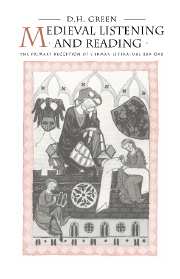Summary
This book has been a long time in the making. It goes back to 1978, when I published an essay on oral poetry and written composition, and 1979, when in a book on medieval irony I touched on oral and written composition in the context of the narrator. Looking back on these attempts I see now that the first suffered from a too ready equation of verbs like hoeren and sagen with orality and the second from an uncritical acceptance of the oral-formulaic theory. In other words, they suffered the disadvantage of being written at that time. In German literature the pioneer is M. G. Scholz and it is a pleasant duty to record my debt to his work. My own would have been unthinkable without his preliminary labours and the courtesy he has shown in prolonged correspondence. We stand closer together than often appears.
On beginning work in 1980 I held the tentative view that it might yield one or two articles. Twelve years and hundreds of pages later I can only marvel at this naïvety. The work has been long and enjoyable, but writing could only be done in retirement (our political masters do not make it easy for academics to write books before this). Writing in retirement imposes its own urgency, for one is aware of the passing of time. This is mentioned only to explain why aspects of my problem are not touched on in these pages, so that work enough remains to be done.
- Type
- Chapter
- Information
- Medieval Listening and ReadingThe Primary Reception of German Literature 800–1300, pp. xi - xiiPublisher: Cambridge University PressPrint publication year: 1994



